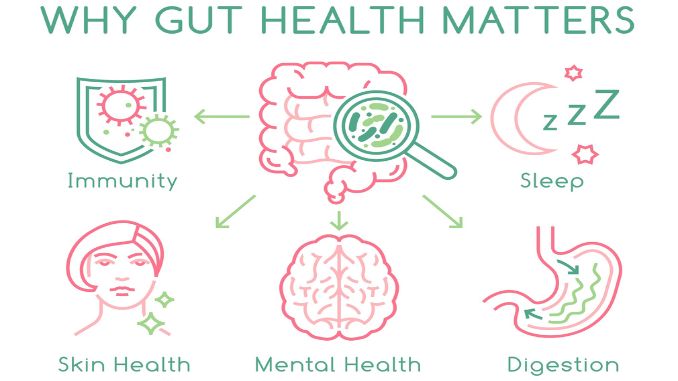In the intricate world of gut health, where trillions of microbes coexist harmoniously, vitamins emerge as unsung heroes, wielding profound influence over digestive wellness. From strengthening immunity defenses to fine-tuning your microbes. These micronutrients play a big role in maintaining the delicate balance within our gastrointestinal ecosystem.
In this article, we explore how various vitamins interact with the gut. Each vitamin serves a pivotal function in maintaining gut health. For example, vitamin A helps protect the lining of the gut, while zinc helps the immune system function properly [¹]. Understanding these interactions is important for overall gut health.
As we unravel the complexities of this symbiotic relationship, we unveil the pivotal role vitamins play in promoting digestive resilience, immunity, and overall well-being. Join us as we navigate the intricate pathways of the gut, guided by the profound impact of vitamins, from A to Zinc.
Importance of Gut Health

Understanding the significance of gut health is essential because it plays a big role in keeping us healthy. Moreover, aside from just digesting food and taking in nutrients, our gut is like a bustling community of tiny organisms that interact with our immune system [²]. Additionally, it affects how we burn energy and even talk to our brain through the gut-brain axis.
Having a healthy gut is very important for helping us digest food well, making sure our bodies use nutrients effectively, and keeping our immune system strong. Plus, the gut acts as a filter, stopping bad stuff from getting into our bloodstream and causing problems like inflammation or autoimmune issues.
Moreover, when things go out of whack in our gut—like if the balance of good and harmful bacteria gets messed up or if the gut barrier doesn’t work right—it can lead to all sorts of health problems, like tummy troubles, allergies or even feeling down. Additionally, but the good news is that we can take steps to keep our gut happy and healthy!
Furthermore, by making smart choices about what we eat and how we live, we can give our gut the support it needs to do its job well. This means better digestion, a stronger immune system, happier moods, and a lower risk of chronic diseases. So, taking care of our gut isn’t just about avoiding tummy aches—it’s about setting the stage for our overall well-being.
Factors Influencing Gut Health
1. Diet
Your diet commonly affects your gut health. The types and amounts of nutrients consumed play a vital role in molding the gut microbiome and overall gut health. People with diets that are high in fiber, fruits, vegetables, and fermented foods promote a diverse and healthy gut microbiota.

While those with diets high in sugars, saturated fats, and processed foods can disrupt the balance in your gut, it is also important to drink water regularly. Staying hydrated helps in the digestion and absorption of nutrients, prevents constipation, and supports the overall health of the gastrointestinal tract.
2. Lifestyle
Lifestyles and habits can affect your gut health more than you think. Stress, lack of sleep, and even simply engaging in physical activities can improve or worsen your gut. For example: consistent, good-quality sleep helps maintain the balance of gut microbiota and overall digestive health.
Poor sleep or irregular sleep patterns can disrupt gut bacteria and contribute to digestive disorders. Another example is chronic stress, which can negatively influence gut health by altering gut motility, increasing intestinal permeability, and disrupting the gut’s composition. This leads to Long-term stress which translates to issues like irritable bowel syndrome (IBS) and negatively alters gut microbiota.
However, physical activity has been positively shown to influence gut health, and engaging in moderate-intensity exercise, such as walking, cycling, or swimming, can support your gut.
3. Environmental Factors

Often minimal, environmental factors can still affect gut health through pollution or exposure to microorganisms. Even hygiene practices can disrupt your gut health, poor hygiene can affect your gut and digestive system.
While having good hygiene, prevents you from contracting diseases that negatively affect your gut or overall health. Early-life exposure to various microorganisms through contact with pets, outdoor activities, and diverse environments can promote a resilient digestive system.
As for pollution, exposure to these environmental pollutants can disrupt the gut microbial balance, compromise gut barrier function, and contribute to inflammation and gastrointestinal disorders.
4. Medical Conditions

Medical conditions can also affect gut health, especially disorders such as Gastrointestinal Disorders. Conditions such as inflammatory bowel disease (IBD), celiac disease, and gastroesophageal reflux disease (GERD), can significantly impact gut health.
Inflammatory bowel disease or IBD, can cause significant problems such as persistent inflammation in the gastrointestinal tract that leads to swelling or gut lining damage.
While for celiac disease, the patient’s immune system mounts an attack on the small intestine. This immune response damages the villi, which are tiny, finger-like projections lining the small intestine that absorb nutrients.
The damage to the villi impairs their ability to absorb nutrients from food effectively. Over time, this can lead to malabsorption, resulting in deficiencies in essential vitamins and minerals, such as iron, calcium, vitamin D, and B vitamins.
Lastly, is the Gastroesophageal reflux disease or GERD. It is a chronic condition where stomach acid frequently flows back into the esophagus, causing a range of symptoms and potential complications that affect gut health
Key Vitamins for Gut Health
1. Vitamin A

Vitamin A is pivotal for maintaining a healthy gut lining. It produces mucin, a protective substance that shields the intestines and prevents inflammation or infections. Moreover, Vitamin A regulates the immune system in the gut, ensuring a balanced response and reducing the risk of inflammatory conditions.
2. Vitamin D
Vitamin D plays a crucial role in sealing gaps between intestinal cells. Maintaining a strong gut barrier prevents harmful substances from entering the bloodstream. Additionally, it supports immune function in the gut, lowering the risk of autoimmune disorders and inflammatory bowel diseases.
3. Vitamin B Complex

The B vitamins, including thiamine, riboflavin, niacin, biotin, folate, and cobalamin, are vital for breaking down food into energy. They also support the growth of good gut bacteria, fostering a healthy microbial balance in the gut.
4. Vitamin C
Vitamin C is an antioxidant that protects immune cells from damage and stimulates the production of white blood cells that defend against infections in the gut. Furthermore, it supports collagen synthesis, strengthening the gut lining and maintaining gut barrier function.
Recommended Vitamins for Gut Health
1. BiOptimizers MassZymes
| Brand: BiOptimizers Flavor: Unflavored Unit Count: 120.00 Count Item Form: Capsule Item Weight: 1.2 Ounces Item dimensions L x W x H: 1.7 x 2.5 x 5 inches Product Benefits: Digestive Health Support Age Range (Description): Adult Package Information: Bottle Number of Items: 1 | 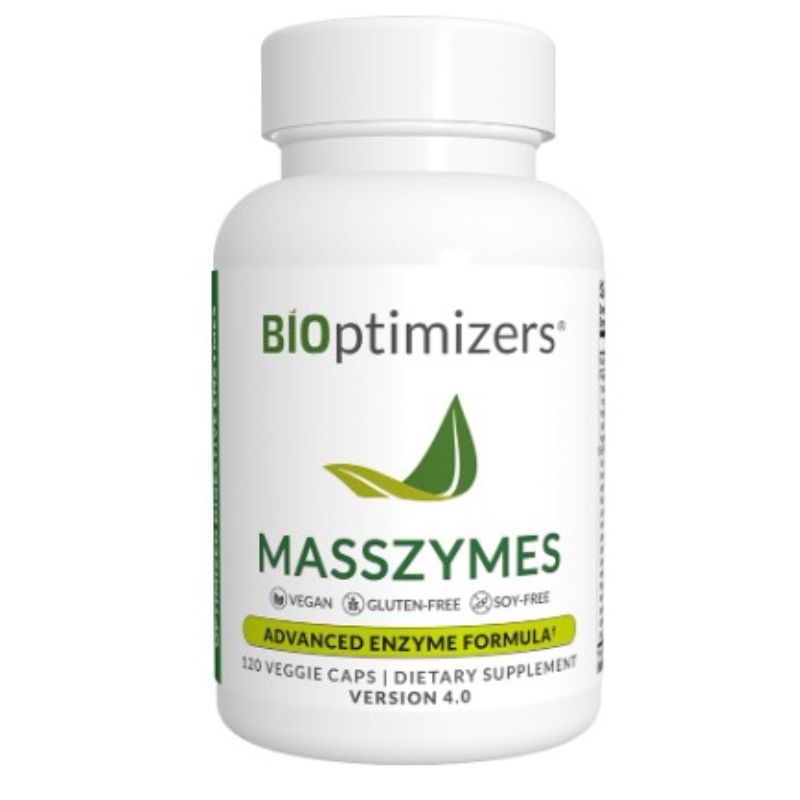 |
MassZymes 3.0 with AstraZyme is a digestive enzyme supplement that contains proteolytic enzymes. Additionally, this supplement can help provide better absorption of amino acids that feed your body, therefore helping alleviate constipation, bloating, and gas relief. Moreover, it boosts your energy with powerful digestive enzymes such as protease, amylase, lipase, and bromelain.
Additionally, better gut health can result in a lift in energy and mood levels. It also enhances mental clarity with better digestion, you now have more time and energy to focus on your day.
The addition of AstraZyme to MassZymes helps further increase the amount of nutrients absorbed from food, helping recovery from workouts. This digestive supplement is derived from a plant-based formulation that does not contain any fillers or artificial ingredients, is dairy-free, and is soy-free.
2. HUM Flatter Me Supplement
| Brand: HUM Flavor: Ginger Primary Supplement Type: Digestive Enzymes Unit Count: 60 Count Item Form: Capsule Item Weight: 0.05 Kilograms Item dimensions L x W x H: 4.02 x 1.61 x 2.17 inches Special Ingredients: Protease Diet Type: Vegan Product Benefits: Digestive Health Support, Stomach Health Support | 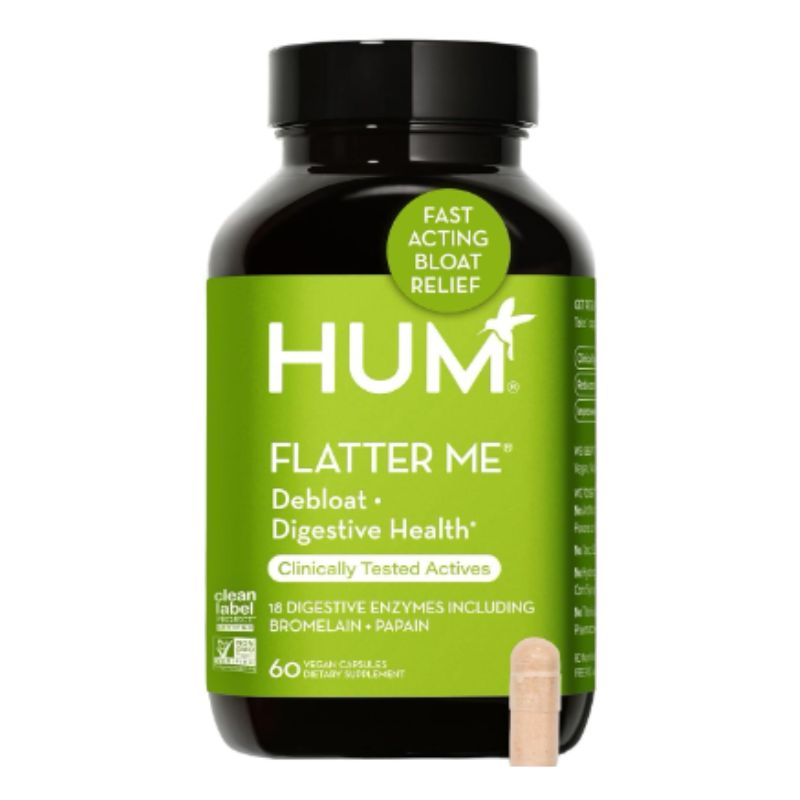 |
The HUM Flatter Me Supplement is a blend of 18 full-spectrum enzymes for digestion and bloating relief. Additionally, flatter Me’s unique no-bloat formula contains 18 full-spectrum digestive enzymes plus ginger, peppermint leaf, and fennel seed. This anti-bloat formula includes ginger and peppermint leaf to support digestive health. helps soothe digestive issues + supports nutrient absorption.*
Moreover, a potent multi-enzyme blend helps break down food for bloating relief. Additionally, all you need is one capsule, twice daily, before your two main meals with the first bite. Flatter Me is compatible with other HUM products for digestion, gut health and more After only one use of Flatter Me debloat pills, 80% of users felt relief.
Additionally, users also felt as much as 2 inches less bloating. Based on a placebo-controlled crossover clinical study of 19 participants who took two identical test meals, one with Flatter Me and one with a placebo. Each participant was assessed by waist circumference measurements.
3. Mannatech GI-Defense Butyrate Supplement
| Brand: Mannatech Flavor: Unflavored Unit Count: 60.00 Count Item Form: Capsule Product Benefits: Gut Health Support Age Range (Description): Adult Package Information: Bottle Number of Items: 1 Servings per Container: 60 Dosage Form: Capsule | 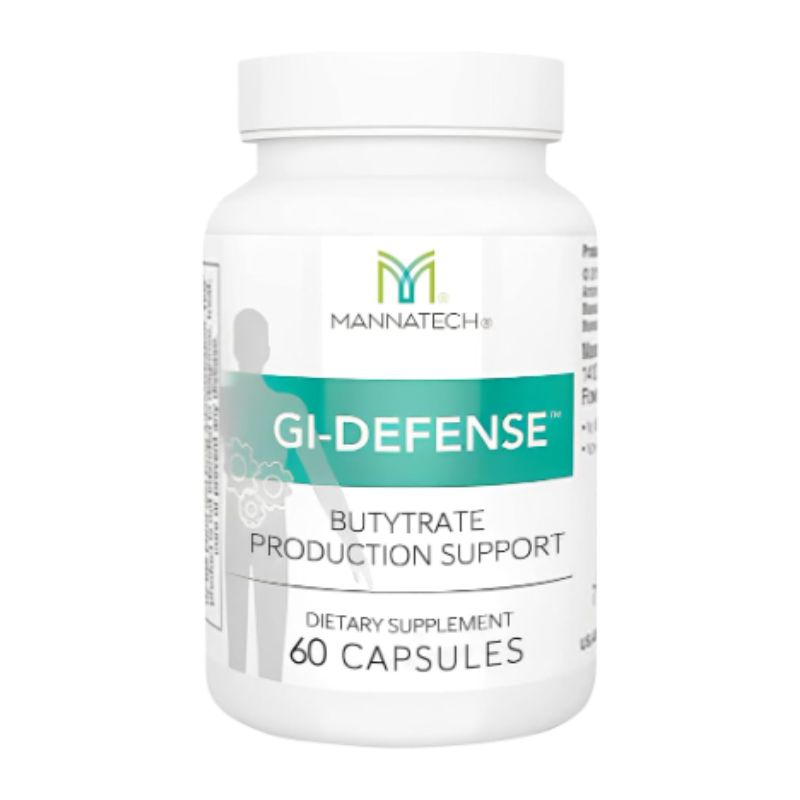 |
GI-Defense capsules are formulated with the Glycobiome and Butyrate Support Blend, which supports your body’s ability to naturally replenish butyrates. Additionally, these capsules act as a primary energy source for the cells lining the colon. It promotes overall gut health.
The formula is free of MSG, soy, dairy, artificial flavors, colors, preservatives, and sweeteners. Moreover, the formula is low glycemic and vegetarian-friendly. GI-Defense butyrate supplement, with an exclusive Glycobiome and Butyrate Support Blend, is specifically formulated to nourish and help strengthen the gut lining.
Furthermore, children age 12 and older can take this product if approved by a health care provider. If you have questions about using the product beyond the directions indicated on the label, you should speak to a qualified healthcare professional.
4. MiraLAX: MiraFIBER Gummies
| Brand: MiraLAX Flavor: assorted fruit Primary Supplement Type: multivitamin Unit Count: 72 Count Item Form: Gummy: Item Weight: 349 Grams Diet Type: Plant Based Product Benefits: A tasty fruit flavored daily prebiotic fiber supplement to help support a more balanced gut* Age Range (Description): Adult Package Information: Bottle | 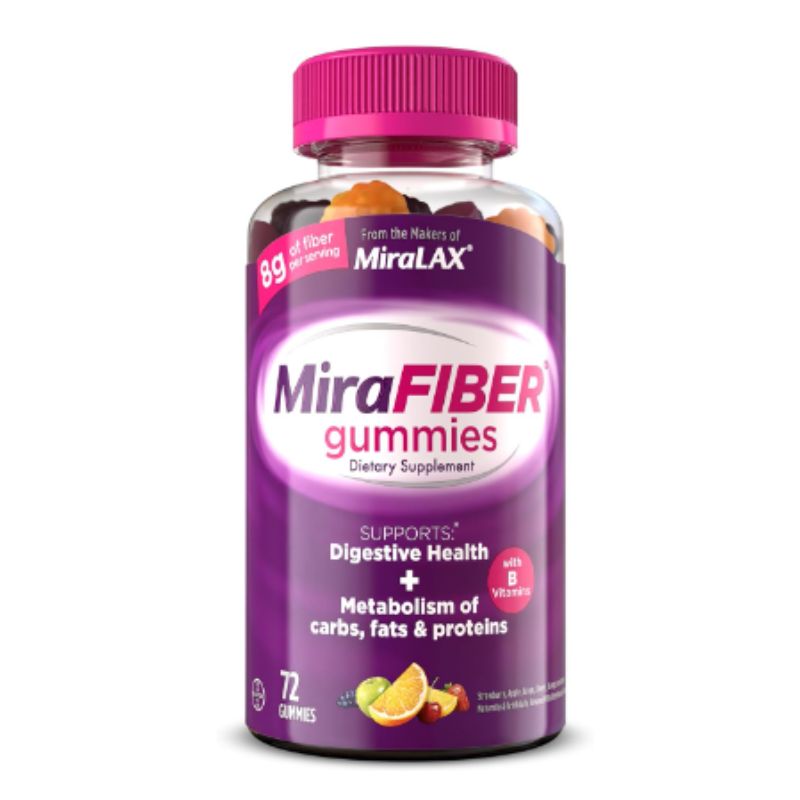 |
Introducing MiraFIBER Gummies, a tasty fruit-flavored daily prebiotic fiber supplement to support a more balanced gut. Additionally, these gummies are also an excellent source of B vitamins—B3, B5, B6, and B12—which help convert food to fuel by supporting the metabolism of fats, carbohydrates, and proteins.
Moreover, these chewable fiber supplement gummies are great for on-the-go and come in 6 assorted fruit flavors: Grape, Strawberry, Apple, Cherry, Orange, and Lemon.
5. BodyBio Gut Health Supplement
| Brand” BodyBio Flavor: Gall Primary Supplement Type: Butyrate Unit Count: 100.00 Count Item Form: Capsule Item Weight: 0.13 Kilograms Item dimensions L x W x H: 2.36 x 2.36 x 2.36 inches Special Ingredients: Postbiotic Diet Type: Keto Product Benefits: Detoxing | 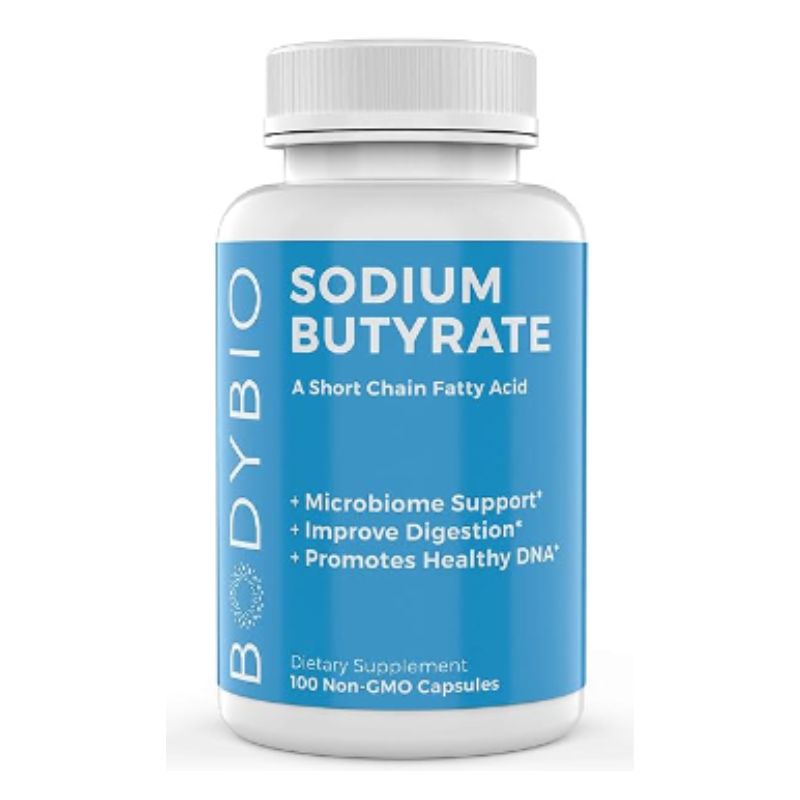 |
Butyrate is a short-chain fatty acid produced in the colon. Additionally, it supports the formation of friendly bacteria that enhance probiotics to help promote digestive health It is unlikely that you get enough butyrate from your food sources to be physiologically beneficial, making butyrate supplementation a prudent habit.
Supports Detoxification & Weight Loss: Butyrate helps cleanse the liver, the gall bladder, and the biliary tree. Moreover, it is also keto-friendly, supports the removal of renegade fats that accumulate as we age and increases leptin production to support healthy weight loss.
Balance your microbiome & get a Healthy inflammation response with BodyBio Butyrate. Additionally, sodium Butyrate is recommended for people with low sodium levels, who sweat profusely from arduous exercise (longer than one hour), or who work in hot environments.
Moreover, everyone can benefit from Butyrate, it is the fuel for a healthy gut. There is no way to achieve the powerful benefits of Butyrate without its distinctive, fermented scent. We do not use fillers or additives.
Furthermore, all natural ingredients and free of wheat, gluten, yeast, corn, soy, dairy, artificial colors, and resins. BodyBio has been scientifically dedicated since 1995, BodyBio products are research-backed and quality-driven.
Additional Considerations
1. Lifestyle Factors Affecting Vitamin Absorption

Various lifestyle factors, such as stress levels, smoking habits, alcohol consumption, and medication use, can impact the absorption and utilization of vitamins in the body. Chronic stress can affect digestion and nutrient absorption by altering gut motility, reducing blood flow to the digestive system, and changing the composition of gut microbiota.
While smoking can decrease the absorption of several vitamins and minerals due to its effects on the digestive system and metabolism. It can impair the body’s ability to absorb vitamin C and folic acid and may also interfere with vitamin D metabolism.
For those who like to drink, excessive alcohol consumption can lead to malnutrition by interfering with the absorption, storage, and metabolism of essential nutrients. Alcohol damages the lining of the stomach and intestines, reducing the absorption of vitamins and minerals such as B vitamins, vitamin A, vitamin D, and zinc.
Lastly, certain medications can affect the absorption, utilization, and metabolism of vitamins and minerals. For example, proton pump inhibitors (PPIs) used to treat acid reflux can reduce stomach acid, impairing the absorption of vitamin B12 and possibly other nutrients.
Managing these factors can effectively optimize how the body absorbs nutrients and vitamins, ensuring their availability for supporting gut health.
2. Potential Risks of Excessive Vitamin Consumption
While vitamins are essential for gut health, excessive intake of certain vitamins can pose health risks. Overconsumption of certain vitamins, particularly fat-soluble vitamins like A and D, can lead to toxicity and adverse effects on gut health.
Understanding recommended intake levels and potential risks associated with excessive consumption is crucial for maintaining optimal gut health.
3. Supplementation When Necessary

In some cases, dietary sources alone may not provide sufficient amounts of vitamins to support optimal gut health. In such instances, supplementation may be necessary to fill nutrient gaps or address specific deficiencies. And there are more than just vitamins to choose from. Additionally, minerals, Supplements, Prebiotics, and Probiotics are also viable options.
Moreover, minerals include zinc and magnesium which both help in maintaining gut health Zinc is essential for immune function and wound healing, which helps maintain gut health, while magnesium is involved in muscle relaxation and the regulation of bowel movements.
For supplements, probiotics contain live beneficial bacteria [³] that help maintain a healthy balance of gut microbiota. Probiotics can improve digestion, support immune function, and may help manage conditions like diarrhea, irritable bowel syndrome (IBS), and inflammatory bowel diseases (IBD).
Prebiotic supplements contain fibers and other compounds that serve as food for beneficial gut bacteria. By promoting the growth and activity of these bacteria, prebiotics help maintain a balanced and diverse gut microbiome.
Importance of Consulting Healthcare Professionals

Consulting healthcare professionals, such as dietitians or doctors, can provide personalized guidance on vitamin intake. Additionally, medical professionals will base it on individual health status, dietary habits, and specific gut health concerns.
Chronic stress Also, professionals can help assess nutrient needs, identify potential deficiencies or excesses, and recommend appropriate dietary modifications or supplementation strategies.
Conclusion
The connection between vitamins and gut health only enhances the critical importance of nurturing our gastrointestinal ecosystem. Additionally, from the fortification of gut barriers to the modulation of immune responses from issues such as leaky gut syndrome, vitamins serve as indispensable allies in maintaining digestive resilience and overall well-being.
However, achieving optimal gut health encompasses more than just vitamin intake. Moreover, it requires a holistic approach that considers lifestyle factors, environmental influences, and supplementation when necessary.
Furthermore. by embracing a balanced diet, managing stress, and seeking proper guidance, people can help themselves cultivate a healthy gut. As we navigate the complex pathways of gut health, let us heed the profound impact of vitamins, from A to Zinc, as foundational pillars supporting our journey toward digestive wellness.
Discover the vital role vitamins play in promoting gut health, immunity, and overall well-being. Join us on a journey through the intricate pathways of the gut, guided by the profound impact of vitamins from A to Zinc. Don’t miss out on our 14-Day Digestive Health Quick Start Program, designed to help you optimize your gut health and enhance your well-being.


Rick Kaselj MS, is a leading kinesiologist and injury specialist as well as co-creator of the best-selling Unlock Your Hip Flexors program. Rick creates exercise programs that help people heal injuries and eliminate pain, so they can go back to living a full, active, healthy life.

